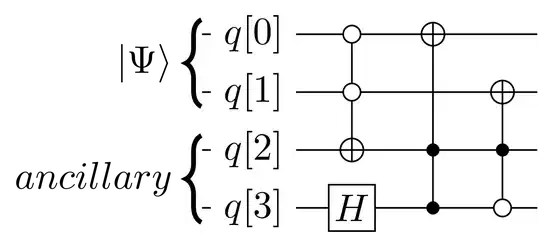If you've got
$$|\Psi\rangle = \frac{1}{\sqrt{2}}|00\rangle+\frac{1}{2} \Big( |01\rangle + |10\rangle \Big)$$
and you want to suppress state $|00\rangle$ using two ancillary qubits, you can
- apply a negated Toffoli gate to an ancillary qubit
q[2] as target
- apply Hadamard to a second ancillary
q[3]
- Toffoli $\mathbf{CCX}(q[2],q[3],q[0])$
- $\mathbf{X}(q[3])$
- $\mathbf{CCX}(q[2],q[3],q[1])$
and you'll obtain
$$|\Psi_1\rangle = \frac{1}{\sqrt{2}}\Big( |01\rangle + |10\rangle \Big)$$
Simplyfing:

In general (if the state $|\Psi\rangle$ is not a simple superposition) you can use a negated Toffoli gate (or a series of $n-1$ negated Toffoli gates for an input register of $n$ qubits) to get the state $|00\rangle$ (or the state $|0\rangle^n$ for an input register of $n$ qubits) to an ancillary qubit (or $n-1$ ancillary qubits) and then suppress it to obtain the desired result (this depends on the result you want to obtain).
